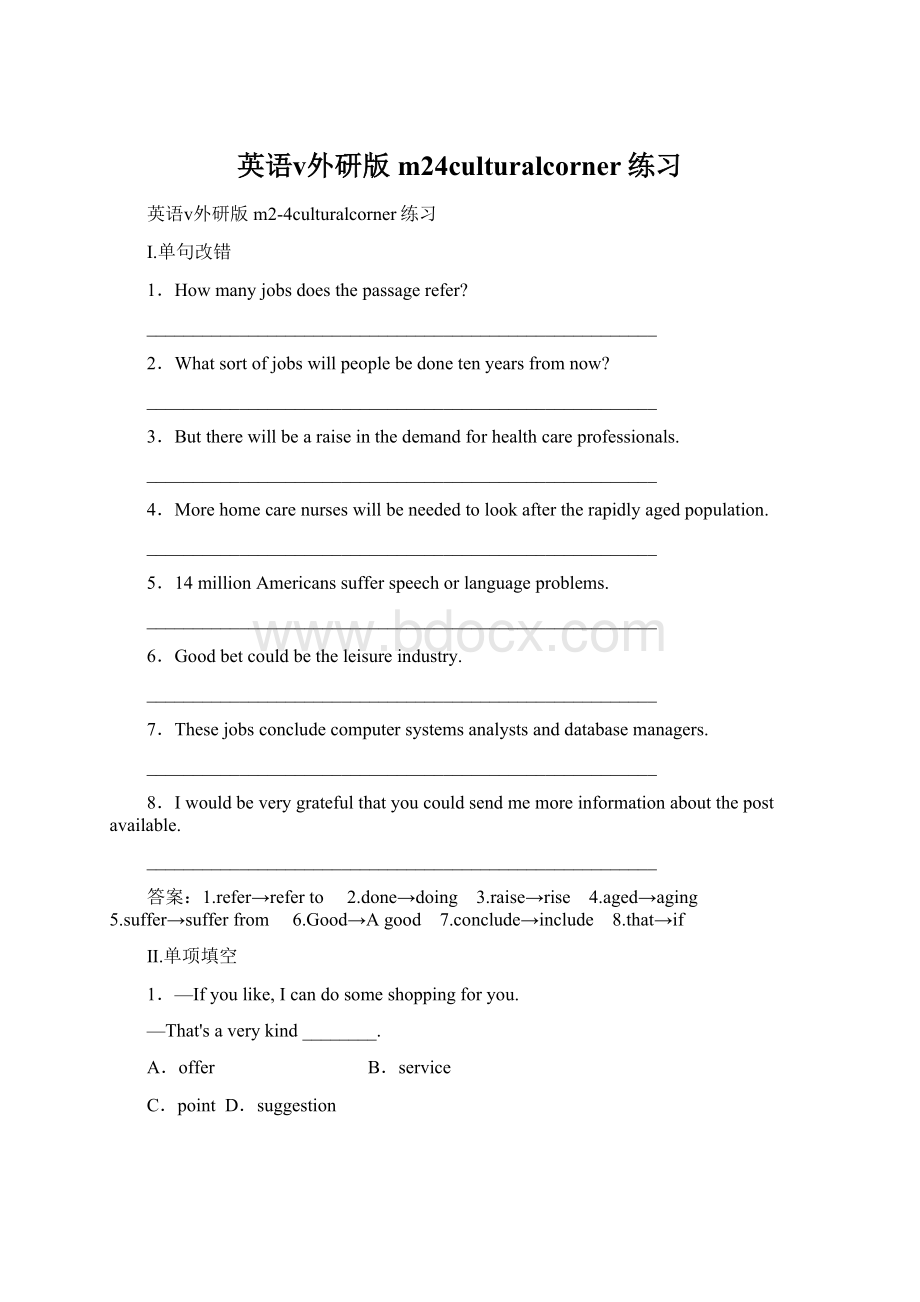英语ⅴ外研版m24culturalcorner练习.docx
《英语ⅴ外研版m24culturalcorner练习.docx》由会员分享,可在线阅读,更多相关《英语ⅴ外研版m24culturalcorner练习.docx(7页珍藏版)》请在冰豆网上搜索。

英语ⅴ外研版m24culturalcorner练习
英语ⅴ外研版m2-4culturalcorner练习
Ⅰ.单句改错
1.Howmanyjobsdoesthepassagerefer?
_______________________________________________________
2.Whatsortofjobswillpeoplebedonetenyearsfromnow?
_______________________________________________________
3.Buttherewillbearaiseinthedemandforhealthcareprofessionals.
_______________________________________________________
4.Morehomecarenurseswillbeneededtolookaftertherapidlyagedpopulation.
_______________________________________________________
5.14millionAmericanssufferspeechorlanguageproblems.
_______________________________________________________
6.Goodbetcouldbetheleisureindustry.
_______________________________________________________
7.Thesejobsconcludecomputersystemsanalystsanddatabasemanagers.
_______________________________________________________
8.Iwouldbeverygratefulthatyoucouldsendmemoreinformationaboutthepostavailable.
_______________________________________________________
答案:
1.refer→referto 2.done→doing 3.raise→rise 4.aged→aging 5.suffer→sufferfrom 6.Good→Agood 7.conclude→include 8.that→if
Ⅱ.单项填空
1.—Ifyoulike,Icandosomeshoppingforyou.
—That'saverykind________.
A.offer B.service
C.pointD.suggestion
答案:
A 上句意为:
如果你喜欢,我可以为你去买一些东西。
答语意为:
你主动提出帮助,那太好了。
offer在此用作名词,表示“主动提供帮助”。
service“服务”;point“观点”;suggestion“建议”。
2.—I'dliketocallyouat10o'clocknextFridaymorningifitisconvenient.
—I'mafraidI________animportantexam.
A.willhaveattendedB.willbeattending
C.attendD.amattending
答案:
B 句意是“如果方便的话,我想下周五上午10点打电话给你。
”“恐怕(那时)我正在参加一个重要的考试。
”此句要用willbeattending表示将来某一时刻正在进行的动作。
willhaveattended是将来完成时,表示到将来某一时刻已完成的动作。
3.Scientiststhinkit________thatamoderncitycanbebuiltundertheocean,butwedoubtwhetherit'llreallyhappen.
A.probableB.possible
C.likelyD.possibly
答案:
B 句意是:
科学家们认为一座现代化的城市有可能在海底建成,而我们却怀疑这是否真的会发生。
possible在此句中作宾语补足语,表示一种潜在的可能性,并不是真的会发生。
4.Isearchedthewebsite.Unfortunately,thejobthatIhadbeenlookingforwasnolonger________.
A.valuableB.reliable
C.incredibleD.available
答案:
D 句意是:
我在站上搜索。
不幸的是,我一直在寻找的工作不再有了。
valuable“有价值的”;reliable“可靠的”;incredible“难以置信的”;available“可得到的”。
5.Forachildtogiveuphislessmatureideaforamoresophisticatedone,itrequiresthatthechild________psychologicallyreadyforthenewidea.
A.isB.be
C.wereD.wouldbe
答案:
B 句意是:
对于一个放弃了不太成熟的想法而寻求比较复杂的想法的孩子来说,他在心理上应为新的想法做好准备。
require表示“要求”,其宾语从句要用虚拟语气,即:
谓语用“should+动词原形”。
6.MyMP4playerisn'tinmybag.Where________Ihaveputit?
A.canB.must
C.shouldD.would
答案:
A 此题考查can表示猜测时的用法。
句意是:
我的MP4没有在我的书包里,我会把它放在哪里呢?
表示可能性时,只有can可用于疑问句中。
7.—Whereismydictionary?
IrememberIputithereyesterday.
—You________itinthewrongplace.
A.mustputB.shouldhaveput
C.mightputD.mighthaveput
答案:
D 此题考查may/might表示猜测时的用法。
句意是“我的字典在哪儿呢?
我记得昨天把它放在这儿了。
”“你可能放错了地方。
”这是对过去情况的猜测,所以要用mighthavedone。
Ⅲ.完形填空
Youhavewaited45minutesforthevaluable10minutesbreakbetweenclasses.Butwhenthebellforthenextclassrings,youcan't__1__howquicklytimehaspassed.
Ifyouarefamiliarwiththis__2__,you'llknowhowtimefileswhenyouarehavingfunand__3__,whenyouarebored.Nowscientistshave__4__areasonwhythisisthecase.
Scanshaveshownthatpatternsofactivityinthebrain__5__accordingtohowwefocusonatask.Whenweare__6__,weconcentratemoreonhowtimeispassing.Andthismakesourbrains__7__theclockistickingmoreslowly.
Inanexperiment__8__byaFrenchlaboratory,12volunteerswatchedanimage__9__researchersmonitoredtheirbrainactivity.
Thevolunteersweretoldto__10__concentrateonhowlonganimageappearedfor,then__11__thecoloroftheimage,andthirdly,studybothdurationandcolor.Theresultshowedthat__12__wasmoreactivewhenthevolunteerspaid__13__subjects.
Itisthoughtthatifthebrainis__14__focusingonmanyaspectsofatask,ithasto__15__itsresources,andpayslessattentiontotheclock.__16__,timepasseswithoutusreally__17__it,andseemstogoquickly.Ifthebrainisnotsoactive,itconcentratesits__18__energiesonmonitoringthepassingoftime.__19__,timeseemstodrag.
Nexttimeyoufeelbored__20__,perhapsyoushouldpaymoreattentiontowhattheteacherissaying!
我们经常会感到快乐的时光似火箭,飞速流逝;而无聊的日子如抽丝,痛苦且漫长。
这到底是怎么回事呢?
1.A.guessB.learn
C.believeD.doubt
答案:
C can'tbelieve体现出了对时间过得如此之快的惊讶与感叹。
2.A.viewB.point
C.sceneD.idea
答案:
C scene在此表示“场景,场面”。
3.A.dragsB.stops
C.backsD.gains
答案:
A 根据文中倒数第二段的解释可得知答案。
drag在此指“(时间)过得很慢”。
4.A.thoughtoverB.madeup
C.suggestedD.comeupwith
答案:
D comeupwith表示“提出”。
5.A.changeB.develop
C.growD.slow
答案:
A 大脑的活动模式会根据我们对任务的注意力的不同而“改变”。
6.A.sleepyB.bored
C.excitedD.active
答案:
B 联系上下文可知,人在比较厌烦或感到无事可做的时候,才会觉得时间过得很慢。
7.A.reportB.think
C.decideD.see
答案:
B 时间过得慢只是人的一种看法。
8.A.producedB.carried
C.triedD.performed
答案:
D perform“实施,进行”。
9.A.soB.after
C.whileD.but
答案:
C while在此表示“在……的过程中”
10.A.partlyB.quickly
C.howD.first
答案:
D 根据后面的then,thirdly可知D项切题。
11.A.rememberB.focuson
C.forgetD.tellapart
答案:
B 根据上文的concentrateon可知B项正确。
12.A.theresearchersB.theexperiment
C.theclockD.thebrain
答案:
D 研究人员监测的是“大脑活动”。
13.A.muchattentiontoB.moreattentionto
C.attentiontomanyD.attentiontomore
答案:
D 试验对象关注的项目越多,大脑越活跃,故D项切题。
14.A.busyB.likely
C.readyD.sure
答案:
A bebusydoing表示“忙于……”。
15.A.focusB.gather
C.reachD.spread
答案:
D 联系上下文可知,当大脑专注于一个任务的多个方面时,它的精力就会被分散。
spread“分散”。
16.A.HoweverB.Furthermore
C.ThereforeD.Finally
答案:
C therefore因此,这样一来,表示因果关系。
17.A.recognizingB.watching
C.noticingD.counting
答案:
C 根据seemstogoquickly可知,时间在不知不觉中过去。
notice“留意”符合语境。
18.A.enoughB.full
C.rightD.proper
答案:
B 大脑不太活跃时,大量的精力都放在了留意时间的流逝上。
19.A.InfactB.Asaresult
C.ForexampleD.Instead
答案:
B asaresult在此表示因果关系。
20.A.inclassB.withwork
C.inmindD.oflessons
答案:
A 由theteacher可知inclass正确。
Ⅳ.阅读理解
LastsummerIwentthroughatrainingprogramandbecamealiteracyvolunteer(扫盲志愿者).ThetrainingIreceived,thoughexcellent,didnottellmehowitwastoworkwitharealstudent,however.WhenIbegantodiscoverwhatotherpeople'sliveswerelikebecausetheycouldnotread,Irealizedthetrueimportanceofreading.
MyfirststudentMariewasa44�year�oldsinglemotherofthree.Inthefirstlesson,Ifoundoutshewalkedtwomilestothenearestsupermarkettwiceaweekbecauseshedidn'tknowwhichbustotake.WhenItoldherIwouldgetherabusschedule(时刻表),shetoldmeitwouldnothelpbecauseshecouldnotreadit.Shesaidshealsohaddifficultyonceshegottothesupermarketbecauseshecouldn'talwaysrememberwhatsheneeded.Sinceshedidnotknowwords,shecouldnotwriteoutashoppinglist.Also,shecouldonlyrecognizeitemsbysight,soiftheproducthadadifferentlabel(标志),shewouldnotrecognizeitastheproductshewanted.
Asweworkedtogether,learninghowtoreadbuildMarie'sself�confidence(自信心),whichencouragedhertocontinueinherstudies.Shebegantomakerapidprogressandwasevenabletotakethebustothesupermarket.Afterthissuccessfultrip,shereportedhowself�confidentshefelt.Attheendoftheprogram,shebeganhelpingheryoungestson,Tony,ashyfirstgrader,withhisreading.Shesatwithhimbeforehewenttosleepandtogethertheywouldreadbedtimestories.Whenhiseyesbecamewidewithexcitementassheread,pridewaswrittenalloverherface,andshebegantoseehowherownhardworkinlearningtoreadpaidoff.Asshedescribedthisexperience,Iwasproudofmyselfaswell.IfoundthathelpingMarietobuildherself�confidencewasmorerewardingthananythingIhadeverdonebefore.
Asaliteracyvolunteer,Ilearnedagreatdealaboutteachingandhelpingothers.Infact,ImayhavelearnedmorefromtheexperiencethanMariedid.
文章大意:
本文讲述了去年夏天“我”参加扫盲志愿活动的事。
在这期间,“我”遇到Marie,并教她识字。
后来,Marie发生了巨大变化,她找回了自信,还可以乘汽车去购物,帮儿子辅导功课……
1.Whatdidtheauthordolastsummer?
A.Sheworkedinthesupermarket.
B.Shehelpedsomeonetolearntoread.
C.Shegavesinglemothersthehelptheyneeded.
D.Shewenttoatrainingprogramtohelpaliteracyvolunteer.
答案:
B 这是一道细节题。
文章第一段第一句告诉我们,作者去年夏天参加了扫盲志愿活动,教人如何读书。
2.Whydidn'tMariegotothesupermarketbybusatfirst?
A.Becauseshelikedtowalktothesupermarket.
B.Becauseshelivedfarawayfromthebusstop.
C.Becauseshecouldn'taffordthebusticket.
D.Becauseshecouldn'tfindtherightbus.
答案:
D 这是一道细节题。
由第二段第三句可判断出Marie到超市不乘公共汽车的原因是她不知道应该乘哪路公共汽车。
3.HowdidMarieusetofindthegoodsshewantedinthesupermarket?
A.Sheknewwherethegoodsshewantedinthesupermarket.
B.Sheaskedotherstotakehertotherightplace.
C.Shemanagedtofindthegoodsbytheirlooks.
D.Sherememberedthenamesofthegoods.
答案:
C 这是一道细节题。
根据第二段倒数第一句中的“only...bysight”可知Marie根据货物的外表来找自己所需的货物。
4.WhichofthefollowingstatementsistrueaboutMarie?
A.Mariecoulddothingsshehadnotbeenabletodobefore.
B.Mariewasabletoreadstorieswiththehelpofherson.
C.Mariedecidedtocontinueherstudiesinschool.
D.Mariepaidforherownlessons.
答案:
A 这是一道细节推断题。
根据第三段可排除B、C、D。
排除B是因为不是在儿子的帮助下;排除C是因为不是在学校学习;排除D是因为教育是免费的(由文章第一句可知)。